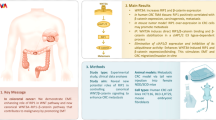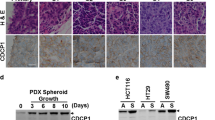Abstract
Aberrant activation of the Wnt/β-catenin signaling pathway is a hallmark of colon cancer. We show that the Wnt antagonist DICKKOPF-4 (DKK-4) gene is repressed by 1α,25-dihydroxyvitamin D3 (1,25(OH)2D3) in human colon cancer cells. This effect correlated with the inhibition of the DKK-4 promoter. Chromatin immunoprecipitation assays revealed that 1,25(OH)2D3 induces early and transient binding of the vitamin D receptor (VDR) and the SMRT corepressor to the region adjacent to the transcription start site of DKK-4. Additionally, we demonstrate that the DKK-4 gene is a new downstream target of TCF/β-catenin. Remarkably, expression of DKK-4 messenger RNA (mRNA) was not detected in a series of 29 human normal (N) colon biopsies but expression was upregulated in all the matched tumour (T) tissues. An inverse correlation existed between the expression of DKK-4 and VDR RNA in the Ts. Ectopic DKK-4 expression increased the migration and invasion properties of colon cancer cells and conditioned media (CM) from DKK-4-expressing cells enhanced the capacity to migrate and form capillary-like tubules of human primary microvascular endothelial cells. In conclusion, DKK-4 is upregulated in colon cancer and is associated with the acquisition of malignant properties by neoplastic cells. DKK-4 downregulation is a novel effect of 1,25(OH)2D3 that may contribute to its anticancer action.
This is a preview of subscription content, access via your institution
Access options
Subscribe to this journal
Receive 50 print issues and online access
$259.00 per year
only $5.18 per issue
Buy this article
- Purchase on Springer Link
- Instant access to full article PDF
Prices may be subject to local taxes which are calculated during checkout






Similar content being viewed by others
References
Abu-Jawdeh G, Comella N, Tomita Y, Brown LF, Tognazzi K, Sokol SY et al. (1999). Differential expression of frpHE: a novel human stromal protein of the secreted frizzled gene family, during the endometrial cycle and malignancy. Lab Invest 79: 439–447.
Aguilera O, Fraga MF, Ballestar E, Paz MF, Herranz M, Espada J et al (2006). Epigenetic inactivation of the Wnt antagonist DICKKOPF-1 (DKK-1) gene in human colorectal cancer. Oncogene 25: 4116–4121.
Aguilera O, Pena C, Garcia JM, Larriba MJ, Ordonez-Moran P, Navarro D et al. (2007). The Wnt antagonist DICKKOPF-1 gene is induced by 1{alpha},25-dihydroxyvitamin D3 associated to the differentiation of human colon cancer cells. Carcinogenesis 28: 1877–1884.
Ballestar E, Paz MF, Valle L, Wei S, Fraga MF, Espada J et al. (2003). Methyl-CpG binding proteins identify novel sites of epigenetic inactivation in human cancer. EMBO J 22: 6335–6345.
Bazzi H, Fantauzzo KA, Richardson GD, Jahoda CA, Christiano AM . (2007). The Wnt inhibitor, Dickkopf 4, is induced by canonical Wnt signaling during ectodermal appendage morphogenesis. Dev Biol 305: 498–507.
Caneparo L, Huang Y-L, Staudt N, Tada M, Ahrendt R, Kazanskaya O et al. (2007). Dickkopf-1 regulates gastrulation movements by coordinated modulation of Wnt/β-catenin and Wnt/PCP activities, through interaction with the Dally-like homolog Knypek. Genes Dev 21: 465–480.
Dufourcq P, Couffinhal T, Ezan J, Barandon L, Moreau C, Daret D et al. (2002). FrzA, a secreted frizzled related protein, induced angiogenic response. Circulation 106: 3097–3103.
Gonzalez-Sancho JM, Aguilera O, Garcia JM, Pendas-Franco N, Pena C, Cal S et al. (2005). The Wnt antagonist DICKKOPF-1 gene is a downstream target of beta-catenin/TCF and is downregulated in human colon cancer. Oncogene 24: 1098–1103.
Kawano Y, Kypta R . (2003). Secreted antagonists of the Wnt signalling pathway. J Cell Sci 116: 2627–2634.
Kimura-Yoshida C, Nakano H, Okamura D, Nakao K, Yonemura S, Belo JA et al. (2005). Canonical Wnt signaling and its antagonist regulate anterior-posterior axis polarization by guiding cell migration in Mouse visceral endoderm. Dev Cell 9: 639–650.
Krupnik VE, Sharp JD, Jiang C, Robison K, Chickering TW, Amaravadi L et al. (1999). Functional and structural diversity of the human Dickkopf gene family. Gene 238: 301–313.
Logan CY, Nusse R . (2004). The Wnt signaling pathway in development and disease. Annu Rev Cell Dev Biol 20: 781–810.
Mao B, Niehrs C . (2003). Kremen2 modulates Dickkopf2 activity during Wnt/LRP6 signaling. Gene 302: 179–183.
Niehrs C . (2006). Function and biological roles of the Dickkopf family of Wnt modulators. Oncogene 25: 7469–7481.
Ordonez-Moran P, Larriba MJ, Pendas-Franco N, Aguilera O, Gonzalez-Sancho JM, Munoz A . (2005). Vitamin D and cancer: an update of in vitro and in vivo data. Front Biosci 10: 2723–2749.
Palmer HG, Gonzalez-Sancho JM, Espada J, Berciano MT, Puig I, Baulida J et al. (2001). Vitamin D(3) promotes the differentiation of colon carcinoma cells by the induction of E-cadherin and the inhibition of beta-catenin signaling. J Cell Biol 154: 369–387.
Pendas-Franco N, Gonzalez-Sancho JM, Suarez Y, Aguilera O, Steinmeyer A, Gamallo C et al. (2007). Vitamin D regulates the phenotype of human breast cancer cells. Differentiation 75: 193–207.
Polakis P . (2007). The many ways of Wnt in cancer. Curr Opin Genet Dev 17: 45–51.
Roth W, Wild-Bode C, Platten M, Grimmel C, Melkonyan HS, Dichgans J et al. (2000). Secreted Frizzled-related proteins inhibit motility and promote growth of human malignant glioma cells. Oncogene 19: 4210–4220.
Segditsas S, Tomlinson I . (2006). Colorectal cancer and genetic alterations in the Wnt pathway. Oncogene 25: 7531–7537.
Sick S, Reinker S, Timmer J, Schlake T . (2006). WNT and DKK determine hair follicle spacing through a reaction-diffusion mechanism. Science 314: 1447–1450.
Vaisanen S, Dunlop TW, Sinkkonen L, Frank C, Carlberg C . (2005). Spatio-temporal activation of chromatin on the human CYP24 gene promoter in the presence of 1alpha,25-Dihydroxyvitamin D3. J Mol Biol 350: 65–77.
Vandesompele J, De Preter K, Pattyn F, Poppe B, Van Roy N, De Paepe A et al. (2002). Accurate normalization of real-time quantitative RT-PCR data by geometric averaging of multiple internal control genes. Genome Biol 3: RESEARCH0034.
Wang TT, Tavera-Mendoza LE, Laperriere D, Libby E, MacLeod NB, Nagai Y et al. (2005). Large-scale in silico and microarray-based identification of direct 1,25-dihydroxyvitamin D3 target genes. Mol Endocrinol 19: 2685–2695.
Xi Y, Formentini A, Nakajima G, Kornmann M, Ju J . (2008). Validation of biomarkers associated with 5-fluorouracil and thymidylaate synthase in colorectal cancer. Oncol Rep 19: 257–262.
Acknowledgements
We thank Drs R Bouillon, M Verstuyf and JP Van de Velde for the gift of 1,25(OH)2D3, Dr O Aguilera for reagents and discussion, Dr A Aranda for providing K45E-VDR, Dr C Niehrs for wild-type and mutant Kremen2 expression constructs, and D Navarro and T Martínez for their technical assistance. We also thank R Rycroft for his valuable assistance in the preparation of the english manuscript. This study was supported by grants from Ministerio de Educación y Ciencia (SAF2004-01015, SAF2007-60341 and SAF2004-04152), Ministerio de Sanidad y Consumo ISCIII-RETIC (RD06/0020/0009), Fundación de Investigación Médica Mutua Madrileña, Comunidad de Madrid (S-GEN-0266-2006) and the European Union (MRTN-CT-2005-019496, NucSys).
Author information
Authors and Affiliations
Corresponding author
Additional information
Supplementary Information accompanies the paper on the Oncogene website (http://www.nature.com/onc).
Rights and permissions
About this article
Cite this article
Pendás-Franco, N., García, J., Peña, C. et al. DICKKOPF-4 is induced by TCF/β-catenin and upregulated in human colon cancer, promotes tumour cell invasion and angiogenesis and is repressed by 1α,25-dihydroxyvitamin D3. Oncogene 27, 4467–4477 (2008). https://doi.org/10.1038/onc.2008.88
Received:
Revised:
Accepted:
Published:
Issue Date:
DOI: https://doi.org/10.1038/onc.2008.88
Keywords
This article is cited by
-
Circulating vitamin D level before initiating chemotherapy impacts on the time-to-outcome in metastatic colorectal cancer patients: systematic review and meta-analysis
Journal of Translational Medicine (2024)
-
Systematic vitamin D supplementation is associated with improved outcomes and reduced thyroid adverse events in patients with cancer treated with immune checkpoint inhibitors: results from the prospective PROVIDENCE study
Cancer Immunology, Immunotherapy (2023)
-
Wnt/β-catenin signalling: function, biological mechanisms, and therapeutic opportunities
Signal Transduction and Targeted Therapy (2022)
-
Claudin1 decrease induced by 1,25-dihydroxy-vitamin D3 potentiates gefitinib resistance therapy through inhibiting AKT activation-mediated cancer stem-like properties in NSCLC cells
Cell Death Discovery (2022)
-
Targeting the Wnt signaling pathway for breast cancer bone metastasis therapy
Journal of Molecular Medicine (2022)



